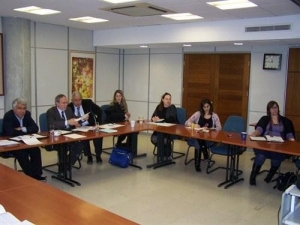The 30th of December marks the end of the SUSTAIN project, which has been co-funded in the framework of the “Europe for Citizens” programme and aimed at promoting the cooperation between the Union of Cyprus Municipalities (UCM) and the Local Union of Municipalities and Communities of the Prefecture of Chios (TEDK Chios) from Greece, in order to develop Twinning links of Municipalities-members of the two Associations with Municipalities from other EU countries.
For 12 months, the UCM and TEDK Chios, worked on promoting the participation of their members in Town Twinning, by analyzing the current situation in the Municipalities, sharing good and bad practices and creating useful tools for them to use.
From the cooperation of these two Associations in the framework of another European project that has been implemented in 2010, (DECISIVE project for the training of volunteers in the Municipalities of Cyprus, in order to support the development of Twinnings with other European countries), the following facts had become evident:
- TEDK Chios has a significant know-how on running EU projects and supporting its members in managing their own projects, but lacked access to Europe-wide networks and information flows.
- On the other hand, the Union of Cyprus Municipalities, through its Brussels Office, has created a vast network of partners able to provide access to information and Municipalities-partners all around Europe, but did not have a mechanism to support its members in submitting project proposals and implementing the actual projects.The SUSTAIN project combined the comparative advantages of the two partners, thus creating beneficial synergies for their members: The Municipalities of Cyprus benefited from the analysis of their processes and their acquaintance with a more structured process of participation in Town Twinning and other European programmes, while the Municipalities in the North Aegean Region now have access to information from Brussels and the possibility to find European partners for their actions and projects.
A common study visit to Brussels also gave participants the opportunity to get acquainted with the Education, Audiovisual and Culture Executive Agency (EACEA) and understand the logic of Town Twinning and of the people working on it.
Within the framework of the SUSTAIN project, a number of tools have also been created, which will be supported by the two partner Associations and are expected to significantly assist the Municipalities of Cyprus and the Northern Aegean Region, in the process of participation in and implementation of Twinning actions and other European programmes. The tools include:
• An intranet. The intranet has been developed as an internal section of the website of the Union of Cyprus Municipalities, which gives access only to registered users. These users will have access to partner searches, completed projects which can be considered as good practices, practical guides and other useful information.
- A “Practical Twinning Guide” (in Greek), containing good practices, information, guidelines and tips for the successful implementation and use of the “Europe for Citizens” programme. This Guide will be a permanent point of reference, not only for the Municipalities and municipal staff of the Greek and Cypriot Municipalities that participated in this project, but also for all of those who would like to participate in the “Europe for Citizens” Programme in the future.
- An inter-municipal network of European Affairs Officers of the Cypriot Municipalities. This network which used to be active in the past, has now been reconstituted and re-activated. Its aim is the mutual support of its members and the constant recording of targets, problems and opportunities in the sphere of Town Twinning and other European Programmes. The network is also using the SUSTAIN intranet, in order to identify and exploit synergies and potential collaborations, with the support of the Union of Cyprus Municipalities.
- Support (advice, implementation guides and integrated examples) for the drafting of five-year “mini business plans” by the Municipalities, outlining their plans and objectives regarding Town Twinning and other European programs.
The benefits from the SUSTAIN project were multiple for all the involved stakeholders:
Union of Cyprus Municipalities: Building upon the interest of Municipalities and the knowledge that the DECISIVE project had created in 2010, the UCM obtained through the SUSTAIN project, a series of practical tools that we presented above, through which it can now effectively support the efforts of its members to participate in Town Twinning. Furthermore, thanks to the work and the final report of the expert of TEDK Chios, the Union of Cyprus Municipalities now has a much better knowledge of the procedures followed by its members when participating in European projects. The UCM knows, therefore, exactly which Municipalities, at which stage of their involvement in Town Twinning and precisely in what way, it can provide its assistance and expertise, in order to support their efforts in the most efficient way.
TEDK Chios: Just like the UCM, TEDK Chios gained through the SUSTAIN project, access to the practical tools of the project, through which it can effectively support the efforts of its members to participate in Twinning actions and other European programmes. In addition to that, it is extremely important that TEDK Chios gained, with no extra cost, effective access to a representation office in Brussels, which offers active presence in Brussels, finding partners, the possibility of timely information on European policies and actions, direct communication with European and international institutions, etc. TEDK Chios also got to know even better the Support Measures and the “Europe for Citizens” programme in general, as well as to develop a more direct relationship with the Education, Audiovisual and Culture Executive Agency (EACEA) and other European institutions, such as the Committee of the Regions (CoR) and DG Regional Policy.
Municipalities: All Municipalities-members of the two partner Associations of the SUSTAIN project have benefited in a direct manner by all the above and can now use all the SUSTAIN tools, which solve a lot of their practical problems. They also now have access to expert help from their Associations, direct access to Brussels and a proposed process (blueprint) that they can follow for their involvement in Town Twinning and other European programmes. They also had the opportunity to meet other Municipalities and learn from their mistakes and their good practices. Finally, many of them had the possibility to become directly acquainted with the Education, Audiovisual and Culture Executive Agency (EACEA) and other European institutions such as the CoR and DG Regional Policy.
European Union: The SUSTAIN project reached dozens of Municipalities in two European countries and has given to hundreds of officials, elected people and citizens, the chance to take part in a European action.
Especially in the seminar “The role of local and regional authorities in fostering European citizenship” that was held in Nicosia on June 7th, more than one hundred representatives of Local and Regional Authorities from the 27 EU Member States had the opportunity to discover best practices of projects that have been implemented within the “Europe for Citizens” Programme.
Representatives of the Municipalities of Cyprus and Greece who participated in the seminar, had the opportunity to meet representatives from other European Municipalities and to get to know the Committee of the Regions, the Education, Audiovisual and Culture Executive Agency and the activities of these two and other European institutions for the promotion of European Citizenship.
The SUSTAIN project has thus given the possibility to a lot of citizens, elected officials and municipal officers to get to know the “Europe for Citizens” Programme and in particular the measure 2.2. (Support Measures).
As it is already known, the SUSTAIN project has been co-funded through the “Measure 2.2. Support Measures” of the Europe for Citizens programme. This measure is a tool to develop the quality of projects submitted within Action 1 “Active Citizens for Europe”. It also supports the exchange of experiences, expertise and good practices, as well as activities which may lead to the establishment of long-lasting partnerships and networks.
For more information on the Programme: http://eacea.ec.europa.eu/citizenship/index_en.php .

